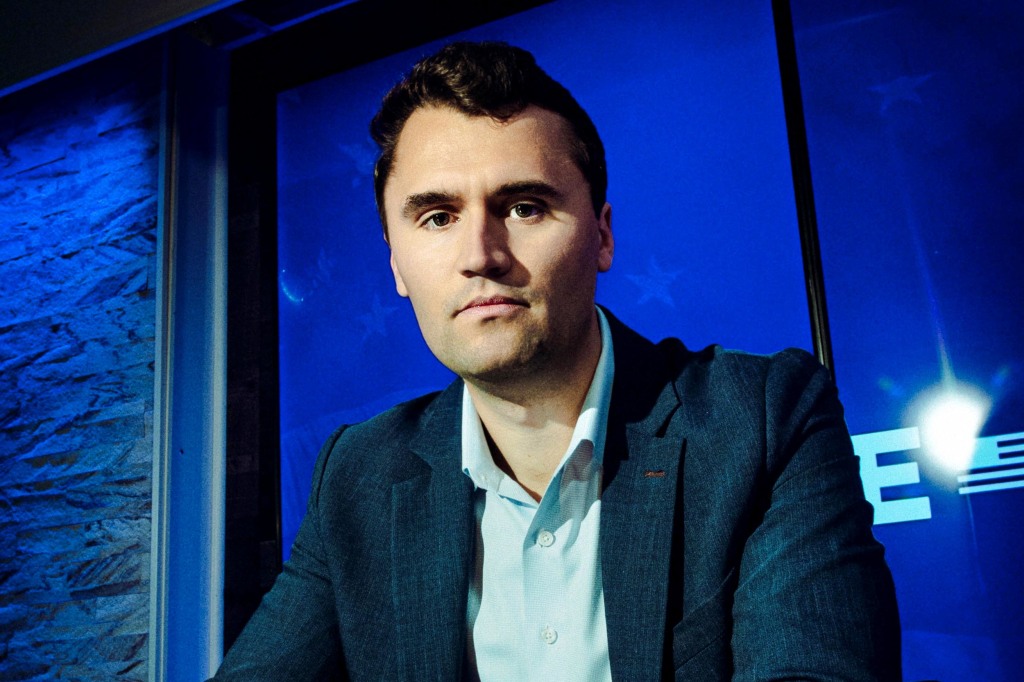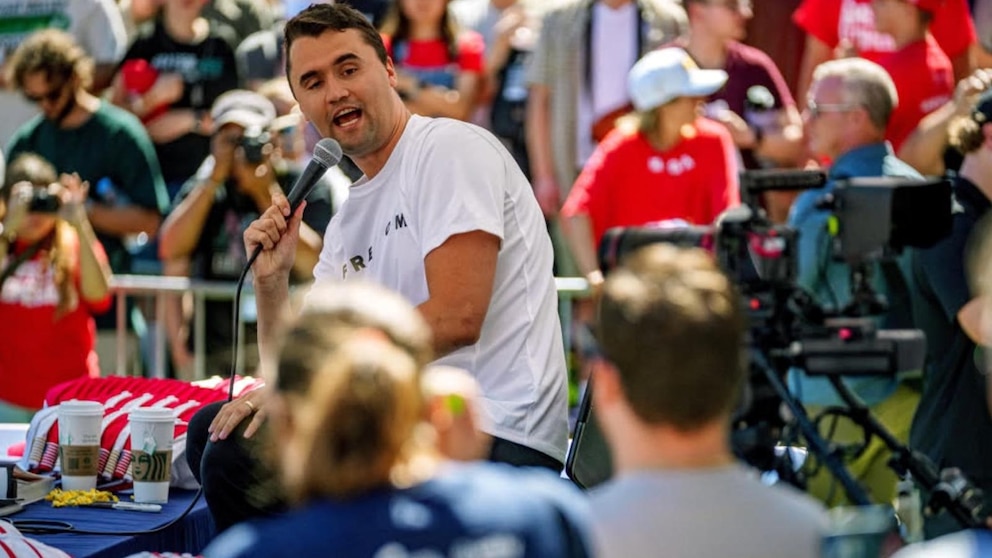“THE PROPHECY TWEET” — Charlie Kirk’s 11-Year-Old Post About a S:h:o:o:t:i:n:g Resurfaces After His D:e:a:t:h — Friends Say He Once Joked About It as If He Somehow Knew, Sending the Internet Into a Frenzy.
The Tweet That Wouldn’t Die
It started with a single screenshot.
At exactly 6:17 p.m. on a rainy Tuesday, a user named @politictruthseeker uploaded an image of an old tweet written over a decade ago by a man named
Ethan Cole — a fiery conservative commentator known for his sharp tongue, big rallies, and endless radio debates. The tweet was simple, short, almost careless:
“If I ever get shot for speaking my mind, at least I’ll die standing.”
For years, it sat buried beneath thousands of newer posts. No one remembered it. No one cared.
Until the night Ethan collapsed on stage in Salt Lake City.
What followed was chaos — confusion, fear, and a flood of questions. And when someone rediscovered that tweet, everything changed.
Within an hour, it had been retweeted over 1.2 million times. Some called it prophecy. Others said it was coincidence. But everyone agreed on one thing: it was chilling.

The Moment That Froze Time
Ethan Cole wasn’t just another political speaker. He was a storm — unpredictable, magnetic, often controversial. To some, he was a hero of free speech. To others, a man who pushed boundaries too far.
That evening, at Utah Valley Forum Hall, he stood under bright lights, his voice echoing through the packed auditorium. The audience of students, reporters, and fans hung on every word.
Then — mid-sentence — his microphone dropped.
His body followed.
At first, everyone thought it was part of the show. He’d done stunts before, after all. But the scream from the front row shattered the illusion. Security rushed forward. Cameras turned away. Within minutes, the building was evacuated.
By the time the paramedics arrived, the rumor mill was already in full motion.
What had happened to Ethan Cole?
And why did that old tweet suddenly feel like a warning from the past?

The Rediscovery
A college student named Liam Torres, scrolling through old archives for a podcast project, was the first to find it.
“I just typed his name into X,” Liam said in an interview. “Then the algorithm brought up this tweet from eleven years ago — it felt unreal.”
He posted a screenshot with the caption:
“This is either the creepiest coincidence ever… or something deeper.”
Within minutes, his post blew up.
Conspiracy threads exploded on Reddit. TikTok was flooded with theories — timestamps, numerology, and slowed-down videos of Ethan’s final speech.
People began connecting dots that might not have been dots at all.
One user zoomed in on his last photo at the event, claiming to see a mysterious shadow near the exit sign. Another said the number of likes on his tweet at the time of his collapse matched the year of his birth.
Logic didn’t matter anymore. Emotion did.

The Internet Turns Detective
For forty-eight hours straight, social media turned into an open investigation.
Some argued Ethan’s tweet was proof of foresight — a man who sensed danger years before it arrived. Others insisted it was nothing more than poetic irony.
But it wasn’t just the tweet itself — it was what came after that fanned the flames.
A journalist named Rebecca Halden published a piece titled “The Last Words of Ethan Cole.”
She claimed that moments before he took the stage, he’d said to a colleague:
“Funny how some things circle back.”
That single sentence — vague, haunting — sent the conspiracy machine into overdrive.
Was he referring to the tweet?
Or something else entirely?

The Family Speaks
Three days later, Ethan’s sister Clara Cole appeared on national television.
She was calm, collected, and visibly heartbroken.
“I don’t believe in predictions or curses,” she said softly. “My brother lived boldly. He knew the risks of speaking freely. That tweet wasn’t prophecy. It was just Ethan — being Ethan.”
But despite her plea for peace, the storm only grew stronger. People analyzed every movement of her interview. Some said her eyes looked “off,” that her pauses were “too deliberate.” Others accused her of hiding something.
It didn’t matter what she said — the internet had already decided there was more to the story.
The Email No One Expected
Then came the leak.
A local blogger, under the username
@utahwatcher, claimed to have received an anonymous email containing a draft version of the tweet — saved in Ethan’s cloud account but never posted publicly.
This version included one extra line:
“If they ever silence me, remember what I said.”
No verification, no proof. But that didn’t stop it from spreading like wildfire.
Talk shows debated it. Hashtags trended. Theories deepened: was Ethan trying to warn his followers? Was he aware of threats?
A popular YouTube analyst called it “the most disturbing digital breadcrumb of the decade.”
Others dismissed it as a clever fake.
Still, the question lingered — if it wasn’t real, who created it? And why now?
The Shadow of Utah
Investigators soon confirmed there was no foul play in Ethan’s death — the cause was cardiac arrest due to an undiagnosed condition. But by then, the truth didn’t matter.
People wanted mystery.
They wanted meaning.
The phrase “Prophecy Tweet” trended for eleven straight days. Podcasts dissected it minute by minute. TikTok creators recreated the scene using AI voice clones, dramatizing every word.
And through it all, one thing became clear: the internet didn’t just remember Ethan Cole. It had reborn him.
In a digital world hungry for myth, his final tweet became scripture.
The Friend Who Couldn’t Stay Silent
Weeks later, an old friend of Ethan’s, Marcus Jennings, decided to speak. He’d known Ethan since college — back when the two co-hosted a campus radio show about free speech.
“He was the kind of guy who’d tweet dramatic stuff just to make people think,” Marcus said. “That line — about getting shot — it wasn’t dark. It was defiance. It meant:
I’ll never shut up for anyone.”
Still, even Marcus admitted that the timing was eerie.
“The world twisted it into something mystical,” he sighed. “But maybe that’s what happens when a person’s words outlive them.”
He paused, then added quietly:
“Sometimes, the truth isn’t hidden. It’s just ignored.”
The Candlelight Vigil
On the 40th day after Ethan’s passing, hundreds gathered outside the University Hall where his final event had been held. They brought candles, posters, and printed copies of his “prophecy tweet.”
Someone projected the tweet onto the side of a nearby building in glowing white letters.
For a few moments, silence fell over the crowd.
Then a woman in the front — a mother holding her child — whispered,
“He wasn’t afraid to speak. Maybe that’s why we remember him.”
Phones went up, flashes lit the night, and once again the tweet trended — this time under a new hashtag: #StandLikeEthan.
The Message Hidden in the Metadata
But the internet wasn’t done yet.
A cybersecurity researcher named Daniel Voss analyzed the tweet’s archived metadata. What he found sent shockwaves through online circles:
the original post’s timestamp didn’t match the public timeline.
The tweet, supposedly written on August 4th, 2012, appeared to have been edited and re-uploaded a year later, just minutes after Ethan received a cease-and-desist letter from a political organization he had criticized on air.
To some, that meant nothing. To others, it meant everything.
“Maybe he knew they were watching,” Daniel speculated during a live interview. “Or maybe he wanted them to think he wasn’t afraid.”
Theories piled up — some rational, others bordering on fantasy.
But the narrative had already evolved beyond truth.
Ethan Cole was no longer a man.
He was a myth — a modern-day Cassandra of the internet age.
From Meme to Movement
In the weeks that followed, a movement emerged.
Activists, commentators, even comedians began quoting Ethan’s tweet as a symbol of standing firm in one’s beliefs. Murals appeared in Los Angeles, New York, and Austin.
A high school teacher in Florida used the line to inspire students in a debate class.
A metal band in Germany named their new album “Die Standing.”
What had started as a tragic coincidence became a rallying cry for resilience.
But quietly, in the corners of online forums, some still whispered that the full story hadn’t been told — that a hidden message was buried somewhere in Ethan’s digital past.
The Forgotten Draft
Two months later, during a server migration, Ethan’s team accessed his archived social media data.
There it was — the original draft of his tweet.
Same words.
Same timestamp.
No secret line.
But beneath it, in a notes file, was a single sentence:
“They’ll twist whatever I say. So I’ll make sure my words outlive me.”
That was the final piece of the puzzle — not prophecy, but intention.
He didn’t predict his own end; he predicted the world’s reaction to it.
And in that eerie, poetic way, he had been right all along.
A World That Needed a Story
Psychologists later analyzed the phenomenon.
Why had one tweet — just 15 words long — captured the public imagination so powerfully?
Dr. Lena Morales, a behavioral researcher, offered a simple answer:
“Humans crave patterns, even in tragedy. We need stories to make sense of chaos.”
Ethan’s death was sudden, shocking, and unfair.
The tweet gave it shape.
It turned random loss into something that felt meaningful.
And in a world flooded with information, meaning is the rarest currency.
The Legacy That Refused to Fade
A year later, Ethan Cole’s official foundation launched a scholarship for students studying journalism and communication ethics. Its slogan: “Speak boldly. Stand firmly. Die standing if you must.”
The phrase once written in a tweet had now become engraved in metal plaques across campuses nationwide.
Clara, his sister, attended the first award ceremony. She stood before hundreds of students and said quietly:
“My brother’s words were never a warning. They were a promise — that truth is worth the risk.”
The crowd rose to their feet.
And for the first time since that fateful night in Utah, the noise around Ethan’s name softened into something beautiful: remembrance.
The Tweet Lives On
Today, more than a decade after Ethan Cole’s original post, that tweet remains one of the most quoted lines in political media. It appears on posters, memes, documentaries — even graffiti.
But somewhere, buried deep in the archives of the internet, is a reply he once wrote to a follower who asked what he meant by “die standing.”
His response was simple:
“It means live honestly — even when it costs you.”
And perhaps, that was the real prophecy all along.
